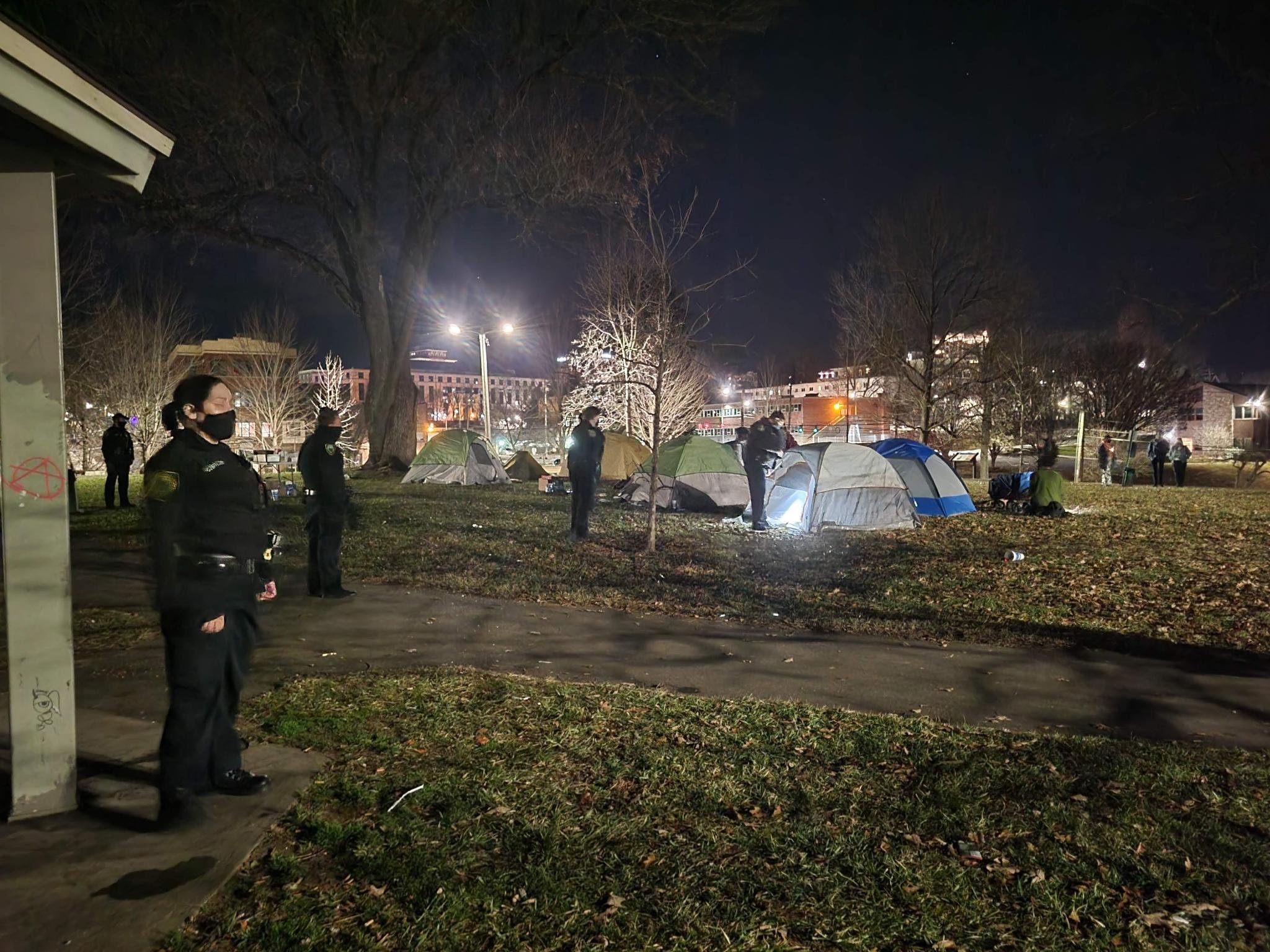
Asheville Blade journalists Veronica Coit and Matilda Bliss are appealing their convictions for trespassing. They had refused to leave a North Carolina park where they were covering the news.
A new appeal in North Carolina could set the state’s legal standard for when police can bar journalists from public places where they’re covering the news.
Journalists Veronica Coit and Matilda Bliss of The Asheville Blade were convicted of trespassing after a five-day trial in June 2023. Police arrested them while they were reporting on and recording a protest and police sweep at a homeless encampment in a public park in Asheville, North Carolina, on Christmas Eve of 2021. Authorities moved forward with the prosecution even as press freedom groups around the country condemned it.
Coit and Bliss are now appealing to the North Carolina Court of Appeals on First Amendment grounds. They argue that the trespassing law was unconstitutional as applied to them, and that the court incorrectly suggested to jurors they couldn't consider the First Amendment when deliberating.
Coit and Bliss are far from the first journalists arrested while covering a protest. But their conviction is unusual, since, in most cases, authorities come to their senses and drop charges against journalists before they go to trial. The decision to drop charges is often the result of public pressure. But there’s also a growing recognition of the First Amendment right of the press to cover protests happening in public places.
For example, after protests over the police killing of George Floyd rocked the country in 2020, a federal appeals court in California upheld an order based on the First Amendment that forbade federal officials from arresting journalists for not dispersing from protests in Oregon after being ordered to do so. As the court explained: “Public demonstrations and protests are clearly protected by the First Amendment, and a protest not open to the press and general public is not a public demonstration.”
Even the Department of Justice — which has aggressively pursued journalists in other cases — has recognized that the press has a right to be present to cover protests. Following the protests in Minneapolis over Floyd’s killing — and the harsh crackdown by police on both protesters and the press — the DOJ specifically recognized that blanket enforcement of dispersal orders and curfews against the press violates First Amendment principles. It faulted Minneapolis police who interfered with newsgathering “by unlawfully limiting journalists’ access to public spaces where protests take place, and thus their ability to report on police.”
That’s exactly what happened to Coit and Bliss. By restricting their access to the park, the authorities prevented the journalists from providing oversight and accountability of the police sweep of the encampment.
It was also totally unnecessary to demand that the Blade journalists leave, and the order left them with no alternative for covering the protest or the police response. There’s no evidence that their presence interfered with the police action in any way. And while officers insisted that the journalists could report from the bottom of a steep hill roughly 150 feet away, that would have left them unable to see or hear what was happening, let alone record officers, especially since it was dark outside.
In other words, as Coit and Bliss put it in their appellate brief, “When journalists cover protests, they must be in the same place as the protesters to gather the news.” Unfortunately, that commonsense point has so far been lost on police, prosecutors, and the North Carolina courts.
Or maybe they understand it all too well. After all, police could be heard remarking on bodycam footage that Coit and Bliss should be arrested first “because they’re videotaping.” By arresting the journalists, police put a stop to their reporting. By prosecuting them, authorities chill other journalists who would do the same.
The Court of Appeals, however, now has a chance to get it right and uphold the First Amendment. Its decision in this case will impact not only Coit and Bliss but all journalists in the state who cover protests, police, or other activities on public land. And, most importantly, it will impact the public, who rely on the press to go where the story is and report the news people need to know.
The court can, and must, find that the First Amendment gives journalists the right to cover police activity in public places. Police may wait until nightfall to break up a protest. But that’s no reason the public should be left in the dark.



